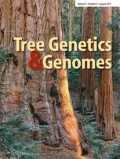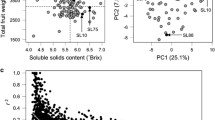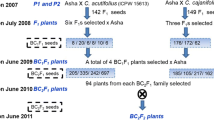Abstract
Over the years, breeding programs have sought efficient strategies to select genotypes with superior performance. Genome-wide selection (GWS) emerged in 2001, aiming to increase efficiency and accelerate selection gain. This technique is considered essential in the breeding of perennial species, such as Coffea canephora, mainly due to the potential to increase the gain per unit of time. Thus, this study aimed to apply the GWS principle, evaluate the efficiency of this technique in C. canephora population using SNP molecular markers, and evaluate eight main phenotypic traits. A total of 165 genotypes were evaluated, being 51 of varietal group of Conilon, 32 of Robusta, and 82 intervarietal hybrids. Through the sequencing of the RAPiD Genomics company, 18,111 SNP markers were identified, of which 14,429 were used after quality analysis. All traits showed good predictive capacity, except for fruit maturation time, fruit size, and yield per plant. The lower values of genomic heritability found for these traits may justify the low values of predictive capacity obtained. The accuracy values estimated were considered as moderate to high, ranging from 67 to 82%. By shortening the cycle time from 6 to 3 years, GWS provided selective efficiency ranging from 22 to 146%. Results revealed that GWS provides higher gains per unit of time. Therefore, GWS proved to be a useful and promising tool for the breeding of C. canephora for accurately predicting the individuals’ genotypes, shortening the time required to complete the selection cycle and providing gains in selective efficiency per unit of time.


Similar content being viewed by others
References
Alkimim ER, Caixeta ET, Sousa TV, Pereira AA, Oliveira ACB, Zambolim L, Sakiyama NS (2017) Marker-assisted selection provides arabica coffee with genes from other Coffea species targeting on multiple resistance to rust and coffee berry disease. Mol Breed 37:6–10. https://doi.org/10.1007/s11032-016-0609-1
Alkimim ER, Caixeta ET, Sousa TV, Silva FL, Sakiyama NS, Zambolim L (2018) High-throughput targeted genotyping using next-generation sequencing applied in Coffea canephora breeding. Euphytica 214:50–18. https://doi.org/10.1007/s10681-018-2126-2
Anderson CA, Pettersson FH, Clarke GM, Cardon LR, Morris AP, Zondervan KT (2010) Data quality control in genetic case-control association studies. Nat Protoc 5:1564–1573. https://doi.org/10.1038/nprot.2010.116
Asins MJ, Fernandez-Ribacoba J, Bernet GP et al (2012) The position of the major QTL for Citrus tristeza virus resistance is conserved among Citrus grandis, C. aurantium and Poncirus trifoliata. Mol Breed 29:575–587. https://doi.org/10.1007/s11032-011-9574-x
Bhering LL (2017) Rbio: a tool for biometric and statistical analysis using the R platform. Crop Breed Appl Biotechnol 17:187–190. https://doi.org/10.1590/1984-70332017v17n2s29
Bernardo R (2010) Breeding for quantitative traits in plants. Stemma Press, Woodbury
Borém A, Fritsche-Neto R (2013) Biotecnologia Aplicada ao Melhoramento de Plantas
Carvalho MC d CG d, Silva DCGD (2010) Sequenciamento de DNA de nova geração e suas aplicações na genômica de plantas. Ciência Rural 40:735–744. https://doi.org/10.1590/S0103-84782010000300040
Castro CA d O, Resende RT, Bhering LL, Cruz CD (2016) Brief history of Eucalyptus breeding in Brazil under perspective of biometric advances. Ciência Rural 46:1585–1593. https://doi.org/10.1590/0103-8478cr20150645
Cavalcanti JJV, de Resende MDV, dos Santos FHC, Pinheiro CR (2012) Predição simultânea dos efeitos de marcadores moleculares e seleção genômica ampla em cajueiro. Rev Bras Frutic 34:840–846. https://doi.org/10.1590/S0100-29452012000300025
de Almeida ÍF, Cruz CD, de Resende MDV (2016) Validação e correção de fenótipos na seleção genômica ampla. Pesqui Agropecuária Bras 51:1973–1982. https://doi.org/10.1590/s0100-204x2016001200008
de Andrade LRB, e Sousa MB, Oliveira EJ et al (2019) Cassava yield traits predicted by genomic selection methods. PLoS One 14:e0224920. https://doi.org/10.1371/journal.pone.0224920
de Resende MDV (2007) Matemática e Estatística na Análise de Experimentos e no Melhoramento Genético, 1st edn, Colombo
de Resende MDV (2016) Software Selegen-REML/BLUP: a useful tool for plant breeding. Crop Breed Appl Biotechnol 16:330–339. https://doi.org/10.1590/1984-70332016v16n4a49
de Resende MDV, Duarte JB (2007) Precisão e controle de qualidade em experimentos de avaliação de cultivares. Pesqui Agropecuária Trop 37:182–194
de Resende MDV, e Silva FF, Lopes PS, Azevedo CF (2012) Seleção Genômica Ampla (GWS) via Modelos Mistos (REML/BLUP), Inferência Bayesiana (MCMC), Regressão Aleatória Multivariada e Estatística. Espacial, Viçosa
de Resende MDV, e Silva FF, Azevedo CF (2014) Estatística Matemática, Biométrica e Computacional: Modelos Mistos, Multivariados, Categorias e Generalizados (REML/BLUP), Inferência Bayesiana, Regressão Aleatória, Seleção Genômica, QTI-GWAS, Estatística Espacial e Temporal, Competição, Sobrevivência, 1st edn. Suprema, Viçosa
Resende MDV de, e Silva FF, Ferreira C, et al (2017) Atualidades da biometria no melhoramento de plantas perenes. In: Ludke WH, Andrade ACB, Volpato L, et al. (eds) Desafios Biométricos No Melhoramento Genético, 1a edição. Viçosa, p 166
Denoeud F, Carretero-Paulet L, Dereeper A et al (2014) The coffee genome provides insight into the convergent evolution of caffeine biosynthesis. Science 345(80):1181–1184. https://doi.org/10.1126/science.1255274
Diniz LEC, Sakiyama NS, Lashermes P et al (2005) Analysis of AFLP markers associated to the Mex-1 resistance locus in Icatu progenies. Crop Breed Appl Biotechnol 5:387–393. https://doi.org/10.12702/1984-7033.v05n04a03
Ferrão LFV, Ferrão RG, Ferrão MAG et al (2017) A mixed model to multiple harvest-location trials applied to genomic prediction in Coffea canephora. Tree Genet Genomes 13:95–13. https://doi.org/10.1007/s11295-017-1171-7
Ferrão LFV, Ferrão RG, Ferrão MAG, Fonseca A, Carbonetto P, Stephens M, Garcia AAF (2019) Accurate genomic prediction of Coffea canephora in multiple environments using whole-genome statistical models. Heredity (Edinb) 122:261–275. https://doi.org/10.1038/s41437-018-0105-y
Fritsche-Neto R, Resende MDV, Miranda GV, DoVale JC (2012) Seleção genômica ampla e novos métodos de melhoramento do milho. Rev Ceres 59:794–802. https://doi.org/10.1590/S0034-737X2012000600009
Garrick DJ, Taylor JF, Fernando RL (2009) Deregressing estimated breeding values and weighting information for genomic regression analyses. Genet Sel Evol 41:55. https://doi.org/10.1186/1297-9686-41-55
Gianola D (2006) Genomic-assisted prediction of genetic value with semiparametric procedures. Genetics 173:1761–1776. https://doi.org/10.1534/genetics.105.049510
Gnirke A, Melnikov A, Maguire J, Rogov P, LeProust E, Brockman W, Fennell T, Giannoukos G, Fisher S, Russ C, Gabriel S, Jaffe DB, Lander ES, Nusbaum C (2009) Solution hybrid selection with ultra-long oligonucleotides for massively parallel targeted sequencing. Nat Biotechnol 27:182–189. https://doi.org/10.1038/nbt.1523
Goddard ME, Hayes BJ (2007) Genomic selection. J Anim Breed Genet 124:323–330. https://doi.org/10.1111/j.1439-0388.2007.00702.x
Gois IB, Borém A, Cristofani-Yaly M et al (2016) Genome wide selection in Citrus breeding. Genet Mol Res 15:1–14. https://doi.org/10.4238/gmr15048863
Grattapaglia D, Resende MDV (2011) Genomic selection in forest tree breeding. Tree Genet Genomes 7:241–255. https://doi.org/10.1007/s11295-010-0328-4
Heslot N, Jannink J-L, Sorrells ME (2015) Perspectives for genomic selection applications and research in plants. Crop Sci 55:1–12. https://doi.org/10.2135/cropsci2014.03.0249
Jannink J-L, Lorenz AJ, Iwata H (2010) Genomic selection in plant breeding: from theory to practice. Brief Funct Genomics 9:166–177. https://doi.org/10.1093/bfgp/elq001
Kemper KE, Goddard ME (2012) Understanding and predicting complex traits: knowledge from cattle. Hum Mol Genet 21:R45–R51. https://doi.org/10.1093/hmg/dds332
Lande R, Thompson R (1990) Efficiency of marker-assisted selection in the improvement of quantitative traits. Genetics 124:743–756
Legarra A, Robert-Granie C, Manfredi E, Elsen J-M (2008) Performance of genomic selection in mice. Genetics 180:611–618. https://doi.org/10.1534/genetics.108.088575
Leroy T, Marraccini P, Dufour M, Montagnon C, Lashermes P, Sabau X, Ferreira LP, Jourdan I, Pot D, Andrade AC, Glaszmann JC, Vieira LG, Piffanelli P (2005) Construction and characterization of a Coffea canephora BAC library to study the organization of sucrose biosynthesis genes. Theor Appl Genet 111:1032–1041. https://doi.org/10.1007/s00122-005-0018-z
Liao P-Y, Lee KH (2010) From SNPs to functional polymorphism: the insight into biotechnology applications. Biochem Eng J 49:149–158. https://doi.org/10.1016/j.bej.2009.12.021
Lopez GAG, McCouch SR, Moncada MDP (2013) A genetic map of an interspecific diploid pseudo testcross population of coffee. Euphytica 192:305–323. https://doi.org/10.1007/s10681-013-0926-y
Meuwissen T (2007) Genomic selection: marker assisted selection on a genome wide scale. J Anim Breed Genet 124:321–322. https://doi.org/10.1111/j.1439-0388.2007.00708.x
Meuwissen T, Hayes B, Goddard M (2001) Prediction of total genetic value using genome-wide dense marker maps. Genetics 157:1819–1829 11290733
Neves LG, Davis JM, Barbazuk WB, Kirst M (2013) Whole-exome targeted sequencing of the uncharacterized pine genome. Plant J 75:146–156. https://doi.org/10.1111/tpj.12193
Neves LG, Davis JM, Barbazuk WB, Kirst M (2014) A high-density gene map of loblolly pine (Pinus taeda L.) based on exome sequence capture genotyping. G3-Genes Genomes Genet 4:29–37. https://doi.org/10.1534/g3.113.008714
Noir S, Anthony F, Bertrand B et al (2003) Identification of a major gene (Mex-1) from Coffea canephora conferring resistance to Meloidogyne exigua in Coffea arabica. Plant Pathol 52:97–103. https://doi.org/10.1046/j.1365-3059.2003.00795.x
Perez P, De Los Campos G (2014) Genome-wide regression and prediction with the BGLR statistical package. Genetics 198:483–495. https://doi.org/10.1534/genetics.114.164442
Pértile SFN, e Silva FF, Salvian M, Mourão GB (2016) Seleção e associação genômica ampla para o melhoramento genético animal com uso do método ssGBLUP. Pesqui Agropecuária Bras 51:1729–1736. https://doi.org/10.1590/s0100-204x2016001000004
Rabier C-E, Barre P, Asp T, Charmet G, Mangin B (2016) On the accuracy of genomic selection. PLoS One 11:e0156086. https://doi.org/10.1371/journal.pone.0156086
Resende MDV (2008) Genômica Quantitativa e Seleção no Melhoramento de Plantas Perenes e Animais, Colombo: E
Resende MDV, Lopes PS, Silva RL, Pires IE (2008) Seleção genômica ampla (GWS) e maximização da eficiência do melhoramento genético. Pesqui Florest Bras 56:63–77
Resende MDV, Resende MFR, Sansaloni CP et al (2012) Genomic selection for growth and wood quality in Eucalyptus: capturing the missing heritability and accelerating breeding for complex traits in forest trees. New Phytol 194:116–128. https://doi.org/10.1111/j.1469-8137.2011.04038.x
Resende M, Caixeta E, Alkimim ER et al (2016) High-throughput targeted genotyping of Coffea arabica and Coffea canephora using next generation sequencing, San Diego, p 1
Resende MDV, Ramalho MAP, Guilherme SR, de F.B. Abreu  (2015) Multigeneration Index in the Within-Progenies Bulk Method for Breeding of Self-pollinated Plants. Crop Sci 55:1202–1211. https://doi.org/10.2135/cropsci2014.08.0580.z
Romero G, Vásquez LM, Lashermes P, Herrera JC (2014) Identification of a major QTL for adult plant resistance to coffee leaf rust (Hemileia vastatrix) in the natural Timor hybrid (Coffea arabica x C. canephora). Plant Breed 133:121–129. https://doi.org/10.1111/pbr.12127
Sant’Ana GC, Pereira LFP, Pot D et al (2018) Genome-wide association study reveals candidate genes influencing lipids and diterpenes contents in Coffea arabica L. Sci Rep 8:465. https://doi.org/10.1038/s41598-017-18800-1
Sousa TV, Caixeta ET, Alkimim ER, Oliveira ACB, Pereira AA, Zambolim L, Sakiyama NS (2017) Molecular markers useful to discriminate Coffea arabica cultivars with high genetic similarity. Euphytica 213:1–15. https://doi.org/10.1007/s10681-017-1865-9
Sousa TV, Caixeta ET, Alkimim ER et al (2019) Early selection enabled by the implementation of genomic selection in Coffea arabica breeding. Front Plant Sci:9. https://doi.org/10.3389/fpls.2018.01934
Toppa EVB, Jadoski CJ (2013) O uso dos marcadores moleculares no melhoramento genético de plantas. Sci Agrar Parana 12:1–5. https://doi.org/10.18188/1983-1471
Valente MSF, Viana JMS, de Resende MDV et al (2016) Seleção genômica para melhoramento vegetal com diferentes estruturas populacionais. Pesqui Agropecuária Bras 51:1857–1867. https://doi.org/10.1590/s0100-204x2016001100008
Van Eenennaam AL, Weigel KA, Young AE et al (2014) Applied animal genomics: results from the field. Annu Rev Anim Biosci 2:105–139. https://doi.org/10.1146/annurev-animal-022513-114119
VanRaden PM (2008) Efficient methods to compute genomic predictions. J Dairy Sci 91:4414–4423. https://doi.org/10.3168/jds.2007-0980
Vieira LGE, Andrade AC, Colombo CA et al (2006) Brazilian coffee genome project: an EST-based genomic resource. Brazilian J Plant Physiol 18:95–108. https://doi.org/10.1590/S1677-04202006000100008
Wong CK, Bernardo R (2008) Genomewide selection in oil palm: increasing selection gain per unit time and cost with small populations. Theor Appl Genet 116:815–824. https://doi.org/10.1007/s00122-008-0715-5
Zambolim L (2016) Current status and management of coffee leaf rust in Brazil. Trop Plant Pathol 41:1–8. https://doi.org/10.1007/s40858-016-0065-9
Zhang Z, Liu J, Ding X et al (2010) Best linear unbiased prediction of genomic breeding values using a trait-specific marker-derived relationship matrix. PLoS One 5:e12648. https://doi.org/10.1371/journal.pone.0012648
Zhao Y, Mette MF, Reif JC (2015) Genomic selection in hybrid breeding. Plant Breed 134:1–10. https://doi.org/10.1111/pbr.12231
Data archiving statement
The SNP data was included in the Supplementary Materials.
Funding
This work was financially supported by the Brazilian Coffee Research and Development Consortium (Consórcio Brasileiro de Pesquisa e Desenvolvimento do Café—CBP&D/Café), by the Foundation for Research Support of the state of Minas Gerais (FAPEMIG), by the National Council of Scientific and Technological Development (CNPq), by the Coordenação de Aperfeiçoamento de Pessoal de Nível Superior—Brasil (CAPES)—Finance Code 001, and by the National Institutes of Science and Technology of Coffee (INCT/Café).
Author information
Authors and Affiliations
Corresponding author
Ethics declarations
Conflict of interest
The authors declare that they have no conflict of interest.
Additional information
Communicated by F. P. Guerra
Publisher’s note
Springer Nature remains neutral with regard to jurisdictional claims in published maps and institutional affiliations.
Electronic supplementary material
ESM 1
(XLSX 7697 kb)
Rights and permissions
About this article
Cite this article
Alkimim, E.R., Caixeta, E.T., Sousa, T.V. et al. Selective efficiency of genome-wide selection in Coffea canephora breeding. Tree Genetics & Genomes 16, 41 (2020). https://doi.org/10.1007/s11295-020-01433-3
Received:
Revised:
Accepted:
Published:
DOI: https://doi.org/10.1007/s11295-020-01433-3




